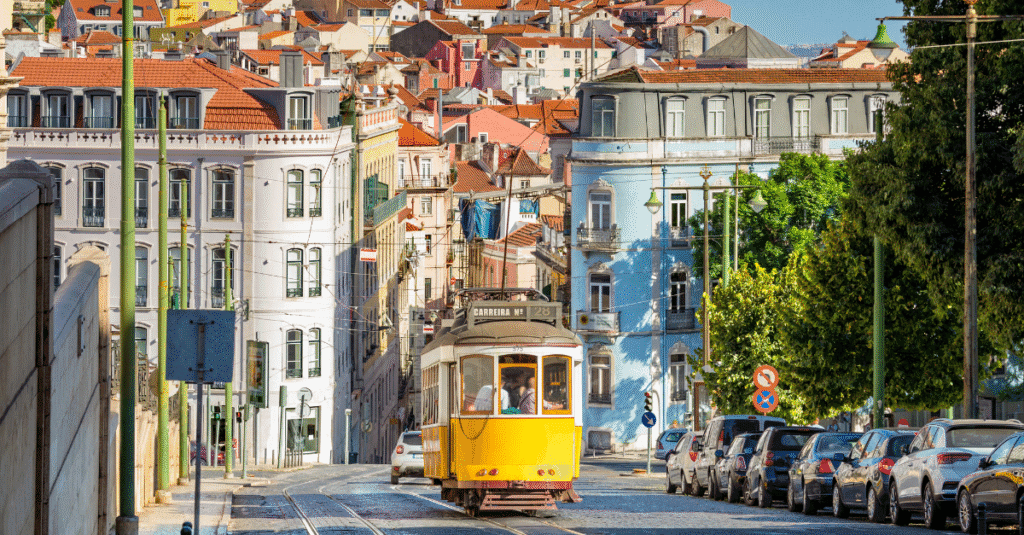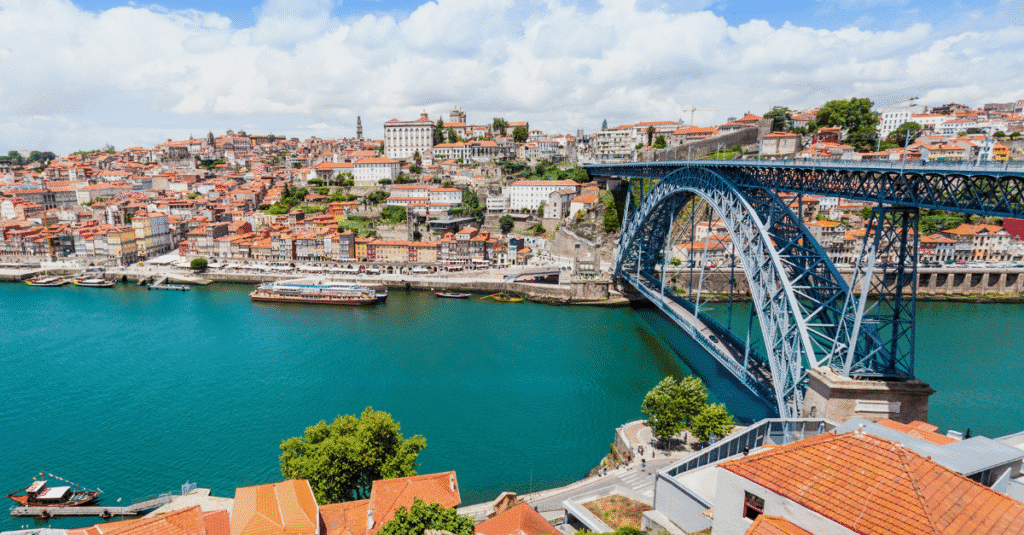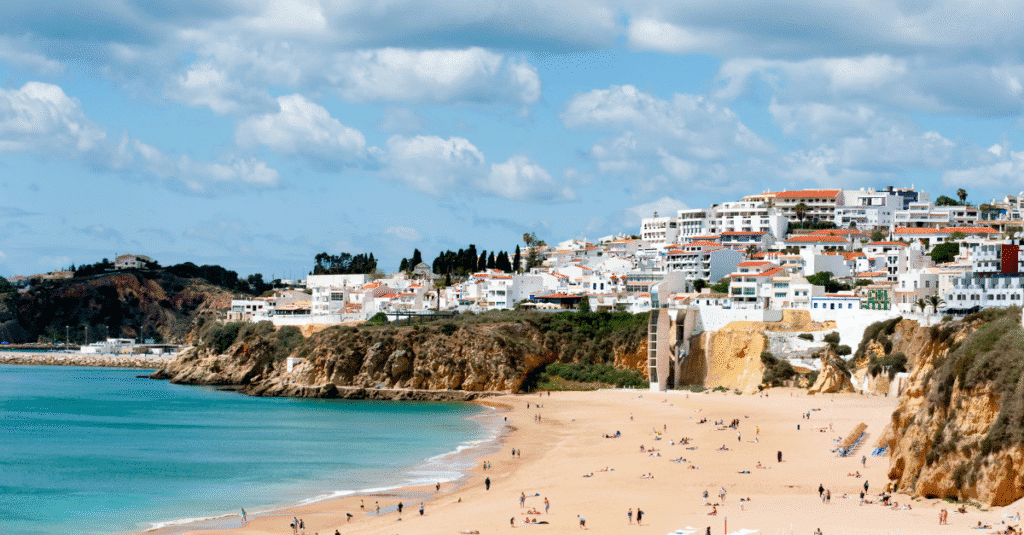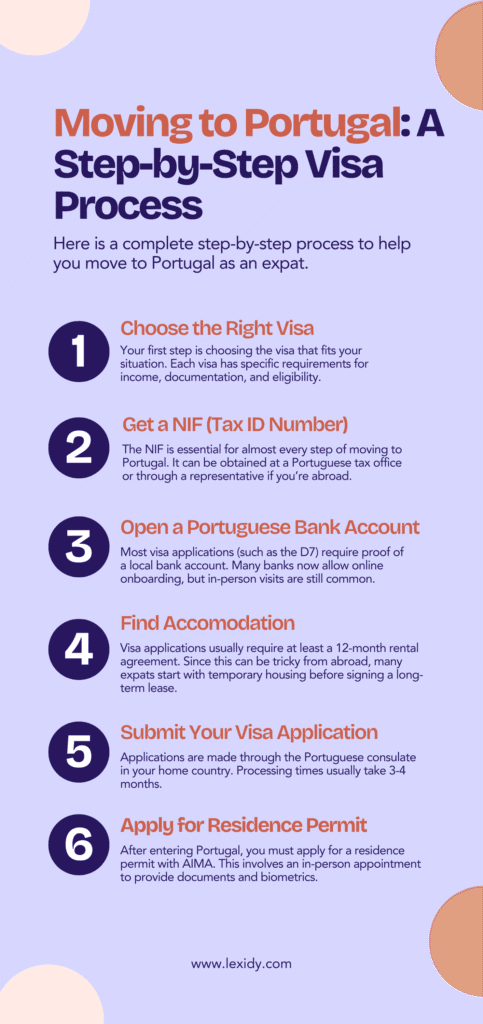Living in Portugal as an expat has become a dream for many, and it’s easy to see why. With over 300 days of sunshine, a slower pace of life, and a lower cost of living compared to much of Western Europe, Portugal attracts retirees, remote workers, families, and professionals alike. In fact, Portugal has become especially popular with American expats looking for a safe, welcoming place to call home.
But moving abroad isn’t without its challenges. From navigating visas to adjusting to cultural differences, expat life in Portugal has both rewards and drawbacks.
This blog breaks down the real pros and cons of living in Portugal as an expat so you can decide if this lifestyle truly fits your goals and expectations.
Table of Contents
The Pros of Living in Portugal as an Expat

When it comes to living in Portugal as an expat, the country offers a balance of affordability, lifestyle, and accessibility that few destinations can match. Below are the main advantages that continue to attract people from all over the world.
Cost of Living
Portugal is generally more affordable than the U.S. and many Western European countries. While Lisbon and Porto have seen rising prices in recent years, daily expenses remain lower than in cities like Paris, London, or New York.
- Housing: Rent and property prices are more affordable outside of Lisbon and Porto, with excellent value in mid-sized cities and rural areas.
- Everyday costs: Groceries, dining out, utilities, and public transport are reasonably priced, making it possible to enjoy a high quality of life on a modest budget.
Quality of Life
Living in Portugal as an expat means a high quality of life. This Mediterranean haven consistently ranks highly for overall lifestyle and well-being.
- Laid-back pace: Portugal is known for its slower rhythm of life, relative to many other countries in Europe. This is particularly the case outside of the big cities, appealing to many expats looking to escape the hustle of more stressful environments.
- Climate and scenery: With over 300 days of sunshine in many regions, Portugal’s mild climate is a major draw. Expats are rarely confined to indoor activities, unlimited access to stunning beaches, historic towns, and fantastic scenery.
- Friendly locals: Portuguese people are known for being warm, polite, and welcoming to foreigners, especially if you make an effort to learn a bit of the language.
- Safety: Portugal is one of the safest countries in the world, with low crime rates and a strong sense of public security.
Healthcare System
Living in Portugal as an expat means affordable and high-quality healthcare through its national health service (SNS), complemented by private hospitals and clinics.
- Expats usually begin with private travel insurance (required for visas like the D7 and Digital Nomad Visa).
- Once a resident, you gain access to the public system, especially strong in primary care and emergencies.
- Private healthcare remains affordable by international standards, with shorter wait times.
Food & Wine
Portuguese cuisine is famous for being fresh, flavorful, and accessible.
- Fresh, local produce is easy to find at neighborhood markets and in local supermarkets.
- From grilled sardines to seafood stews, cheese, pastries, and olive oil, eating well is both a pleasure and a lifestyle.
- Portugal’s wine culture is internationally recognized, with the famous reds of the Douro and Vinho Verde, to the world-renowned Port.
Strategic Location
Portugal’s geographic position makes it a great location for travel to a number of regions.
- Easy access to the rest of Europe via budget airlines and train connections.
- Quick flights to North Africa and relatively short travel times to the Americas.
- Lisbon and Porto both serve as major international travel hubs, with access via sea, rail, road, and air.
Visa & Residency Options
Portugal has developed some of the most expat-friendly visa options in Europe:
- The D7 Retirement Visa is perfect for retirees and remote workers with passive income.
- The D8 Digital Nomad Visa appeals to location-independent professionals.
- The Golden Visa program (though recently changed) has long attracted investors seeking EU residency.
These routes, combined with Portugal’s clear pathway to permanent residency and citizenship, make the country highly attractive for long-term relocation. Not sure which visa is right for you? Talk to our immigration lawyers to determine the best path forward.
The Cons of Living in Portugal as an Expat

While Portugal has much to offer, moving here comes with its challenges, especially for newcomers. Below are some of the most common downsides expats encounter:
Language Barrier (Beyond Tourist Areas)
Although English is widely spoken in tourist zones and major cities, once you step outside these areas, Portuguese quickly becomes essential. This is especially noticeable when dealing with bureaucracy, healthcare, or local services.
Even in Lisbon, navigating public offices or scheduling medical appointments often requires at least basic Portuguese language skills. Expats who invest time in learning Portuguese tend to have a much smoother and more enriching experience.
Job Market Challenges (for Some)
Portugal’s job market is on the rise, especially in sectors like tech, tourism, and remote work. However, it remains competitive for non-Portuguese speakers, particularly in traditional industries.
For those seeking local employment, wages are often significantly lower than in other Western European countries. Many expats opt for remote work, self-employment, or entrepreneurial ventures to overcome this hurdle.
Rising Cost of Living in Popular Areas
Portugal’s popularity has driven up prices in recent years. Price increases are noticeable in Lisbon, Porto, and parts of the Algarve. Housing is the most impacted, with rent and property prices rising steeply due to demand from tourists, digital nomads, and foreign investors.
Affordable living in Portugal as an expat is still possible, but you may have to look outside the main expat hotspots.
Salaries vs. Cost of Living
Even though Portugal’s overall cost of living is lower than in places like the US or UK, the local salaries often don’t keep pace. The imbalance is greater in Lisbon and Porto, where living expenses are climbing.
This imbalance can make it difficult for foreign residents who rely solely on local employment income rather than external funds or remote work.
Cultural Differences & Integration
Portugal is welcoming, but true cultural integration takes time. Social norms, family dynamics, and bureaucracy may differ from what you’re used to.
For example, business communication and government processes may feel slower or less structured than in Northern Europe or North America. Patience, curiosity, and willingness to adapt are key.
Where Do Expats Live in Portugal?
Portugal offers a diverse range of regions that appeal to different types of expats, whether you’re seeking city buzz, coastal relaxation, or island seclusion. Here’s a quick overview of the most popular areas:
Lisbon

The capital city offers vibrant urban life, job opportunities (especially in tech and startups), cultural diversity, and a strong international community. It’s a favorite among younger professionals and digital nomads.
Porto & Northern Portugal

Known for its historic charm, wine culture, and more traditional Portuguese lifestyle. Porto’s tech and creative industries are growing, making it increasingly attractive to younger expats and entrepreneurs.
Algarve

Favored for its stunning beaches, mild year-round climate, and large English-speaking expat population. The southern region is popular with retirees and sun-seekers, especially from the UK and Northern Europe.
Silver Coast

This is a quieter, more affordable alternative to the Algarve, with comparable beautiful coastal towns in addition to a slower pace of life. The Silver Coast attracts families and those looking to avoid tourist hotspots.
Madeira & Azores

These autonomous island regions offer breathtaking landscapes, a relaxed lifestyle, and a strong connection to nature. Ideal for remote workers and expats wanting a unique island living experience.
Each region offers something different depending on your lifestyle preferences, budget, and goals. Whether you’re moving for career growth, retirement, or simply a change of pace, Portugal has options suited to your needs.
How Can I Move to Portugal? Key Steps for Expats

Wondering how to live in Portugal as an expat? The process isn’t overly complicated, but it does involve some careful planning and paperwork, especially for non-EU nationals. Here’s a practical breakdown of the Portugal immigration process:
1. Choose the Right Visa
Your first step is choosing the visa that fits your situation. Common Portugal visa options include:
- D1 Work Visa: For those who have a job offer from a Portuguese employer.
- D2 Entrepreneur Visa: Designed for entrepreneurs, freelancers, or independent professionals planning to start or expand a business in Portugal.
- D7 Passive Income Visa: Ideal for retirees or financially independent individuals with stable income from abroad (pensions, rentals, dividends, etc.).
- D8 Digital Nomad Visa: For remote workers with verifiable income from foreign employers or clients.
- Golden Visa: For high-net-worth individuals investing in Portugal through business or other approved routes (note: real estate investment is no longer eligible).
Curious to learn more about Portugal’s various long-stay visas? Check out our Portugal Type D Visa Guide for more information.
And remember, each visa has specific Portugal visa requirements for income, documentation, and eligibility. Always verify the details with the Portuguese consulate or an immigration professional. Fill out the form below for a free consultation with one of our legal experts.
2. Get a NIF (Tax Identification Number)
The NIF is essential for almost every step of moving to Portugal. You’ll need it to:
- Open a bank account
- Sign a lease
- Register utilities
- File taxes
It can be obtained at a Portuguese tax office or through a representative if you’re abroad.
3. Open a Portuguese Bank Account
Most visa applications (such as the D7) require proof of a local bank account. Many banks now allow online onboarding, but in-person visits are still common.
4. Find Accommodation
Visa applications usually require at least a 12-month rental agreement. Since this can be tricky from abroad, many expats start with temporary housing before signing a long-term lease. Some landlords may ask for a guarantor or upfront payments.
5. Submit Your Visa Application
Applications are made through the Portuguese consulate in your home country. You’ll typically need:
- Valid passport
- Proof of income
- Health insurance
- NIF + bank statements
- Accommodation documents
- Police background check
- Completed forms
- Personal statement
Processing times usually take 3-4 months. Complete, correctly translated paperwork is key to avoiding delays.
6. Apply for a Residency Permit After Arrival
After entering Portugal, you must apply for a residence permit with AIMA (Agência para a Integração, Migrações e Asilo), which replaced SEF in 2023. This involves an in-person appointment to provide documents and biometrics.
Permits are valid for 2 years and renewable. Having your visa, NIF, proof of accommodation, income, and health insurance ready helps avoid delays.
Is Living in Portugal as an Expat Right for You?

Like any major move, deciding on living in Portugal as an expat comes down to personal fit. Many foreigners highlight Portugal’s safety, sunny climate, affordability, and relaxed pace as clear advantages. On the other hand, the cons of living in Portugal often include slower bureaucracy, language barriers, and limited local job opportunities.
If you are financially independent, retiring, or working remotely, Portugal can provide an exceptional quality of life. If you plan to rely on local employment, it’s important to weigh the job market and average salaries carefully.
Ask yourself:
- Can I adjust to a slower pace of life?
- Am I comfortable navigating another language and culture?
- Do my finances align with the rising cost of living in the areas I’m considering?
Before committing, spend time exploring different regions and connecting with other expats. First-hand experience is the best way to see if expat life in Portugal is the right fit for you.
If you want to learn more about how to thrive in Portugal, don’t forget to read our 9 Expert Tips for Becoming an Expat in Portugal.
Living in Portugal as an Expat: Your Next Chapter
Living in Portugal as an expat offers the chance to enjoy sunshine, safety, and a slower rhythm of life while staying connected to the rest of Europe. It’s a place where retirees, families, and remote workers alike can find a lifestyle that feels both relaxed and inspiring.
Of course, every big move comes with challenges — from handling paperwork to adjusting to cultural differences. But with the right preparation, those challenges become part of the adventure.
Ready to see if Portugal is the right fit for you? Fill out the form below to connect with a relocation expert who can guide you through every step of the journey.

